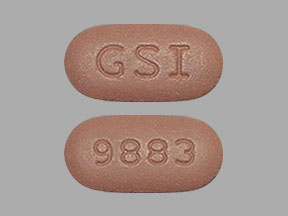Biktarvy and Alcohol/Food Interactions
There are 2 alcohol/food/lifestyle interactions with Biktarvy (bictegravir / emtricitabine / tenofovir alafenamide).
Multivitamins With Minerals Bictegravir
Major Drug Interaction
Products that contain aluminum, calcium, iron, magnesium or other minerals such as antacids and supplements may interfere with the absorption of bictegravir and reduce its effectiveness in treating HIV infection. Additionally, it may lead to development of viral resistance to this and various other HIV medications that are currently used for treatment. When used with antacids, you should generally take bictegravir on an empty stomach at least two hours before the antacid. Avoid taking bictegravir simultaneously with, or 2 hours after, antacid dosing whenever possible. When used with multivitamin or mineral supplements, you may take bictegravir and supplements together at the same time, but with food. Avoid taking bictegravir on an empty stomach simultaneously with, or 2 hours after, dosing of supplements. Talk to your doctor or pharmacist if you have questions on how to take this or other medications you are prescribed, or if you have trouble separating the dosing times. Your doctor may be able to prescribe alternatives that do not interact. It is important to tell your doctor about all other medications you use, including vitamins and herbs. Do not stop using any medications without first talking to your doctor.
Tenofovir Food
Minor Food Interaction
Information for this minor interaction is available on the professional version.
Biktarvy drug interactions
There are 423 drug interactions with Biktarvy (bictegravir / emtricitabine / tenofovir alafenamide).
Biktarvy disease interactions
There are 9 disease interactions with Biktarvy (bictegravir / emtricitabine / tenofovir alafenamide) which include:
- hepatic dysfunction
- renal dysfunction
- hepatitis B
- hepatotoxicity
- hemodialysis
- renal dysfunction
- bone toxicity
- liver disease
- renal dysfunction
More about Biktarvy (bictegravir / emtricitabine / tenofovir alafenamide)
- Biktarvy consumer information
- Check interactions
- Compare alternatives
- Pricing & coupons
- Reviews (201)
- Drug images
- Side effects
- Dosage information
- Patient tips
- During pregnancy
- Support group
- FDA approval history
- Drug class: antiviral combinations
- En español
Related treatment guides
Drug Interaction Classification
| Highly clinically significant. Avoid combinations; the risk of the interaction outweighs the benefit. | |
| Moderately clinically significant. Usually avoid combinations; use it only under special circumstances. | |
| Minimally clinically significant. Minimize risk; assess risk and consider an alternative drug, take steps to circumvent the interaction risk and/or institute a monitoring plan. | |
| No interaction information available. |
Further information
Always consult your healthcare provider to ensure the information displayed on this page applies to your personal circumstances.


